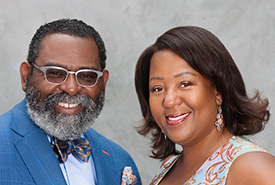By Janet and Gary Smith, Ivy Planning Group

Some of you remember the fear associated with the dawning of the year 2000 known as Y2K. There were predictions that on January 1, 2000, moving from 1999 to 2000, a computer bug would cause all hell to break loose. Computers would be unable to function, causing all manner of dysfunction in banking systems, utilities, and infrastructure. We squirreled away canned goods, water, and cash, just in case we couldn’t access them on January 1. Well, we survived just fine 20 years ago. That’s good to know as we approach a new decade.
As we gear up for 2020, there are several reasons to be concerned. Topping the list is the upcoming U.S, presidential election—a source of polarizing conversations that are sure to find their way into our workplaces, increasing exclusion and stress. But as our company gears up to celebrate its 30th anniversary this year, we’re pausing to think about decades of progress. And that has given us hope.
Here are a few of the reasons we’re hopeful about 2020, and why we think you should be too.
The Gig Economy
A friend told me that everyone needs three things—a career, a job, and a side hustle. I thought to myself, well I’m in trouble because I’m missing two of those! The gig economy is real. The gig economy, defined as a labor market characterized by the prevalence of short-term contracts and freelance work, as opposed to permanent jobs, has started to change employees’ workplace behaviors in ways that can help diversity, equity, and inclusion (DEI).
Once upon a time, a worker landed a job, and stayed for 30+ years, until retirement when they then received a nice gold watch. The tacit employer-employee contract was one of longevity, security, and mutual loyalty. Both sides did their part. For example, skills training and apprenticeships were viewed as investments in employees that would yield fruitful returns. After all, where else could they go? It was a convenient yet imperfect arrangement that included among other things an expectation that employees would do their best to “get along and go along or else.”
So much has changed! Today’s typical entry-level new hire doesn’t expect to stay with the company until retirement. I’ve sat in on interviews where candidates are comfortable framing their tenure with a prospective employer as a “few years.” Most companies are hesitant to invest in comprehensive company-wide training programs. They’d rather hire someone already trained by another company. They consider it wasteful to invest in staff who they expect will leave after a few years. And today’s employees are much more comfortable “fighting the system” because they view the “get along, go along” mentality as an outdated concept. Seeing yourself as a short-timer might contribute to having more courage to speak up.
The willingness of today’s workforce to speak up can be good for DEI. No longer silenced, we are able to get the diverse perspectives and diversity of thought that we seek. And although it’s challenging and not much fun to hear complaints, it’s better to know the reality of the workplace experience, so you can fix the real problems.
The gig economy has also increased the workforce’s understanding of, and appreciation for, how business actually works. Business acumen is a competency that we need—particularly from our emerging leaders. Getting a side hustle (depending on the job you have, and the gig you get) can be like enrolling in an MBA program. Suddenly, people who had little interest in how the business operates, start to notice the importance of marketing, supply chain management, accounts payable, and accounts receivable. While they may not be using these terms, their real-life efforts to find work, do work, and get paid, suddenly focuses their attention in new ways. If properly harnessed, when coupled with a change in how you feel about it, this will be good for business—improving workforce productivity and retention.
The 2020 Census
Nothing captures the attention of people the way data does. Understanding the reality of demographic changes helps drive DEI actions. So we’re so excited about the 2020 Census. We’re convinced that people of color underreport—particularly Latinx and black/African American people—so the opportunity to raise awareness, and therefore raise census participation, is critical, exciting, and necessary.
We know from census data that the majority of U.S. children (ages 0–11 years) are people of color. Think about how knowing that one piece of data can impact your company. How are buying patterns changing for younger consumers or the people that consume for them?
The more accurate the data, the better your decision making can be. Data from the 2020 Census will be used to determine representation in Congress, and how resources are allocated for infrastructure, schools, hospitals, and so on. We encourage you to partner with the U.S. Census Bureau to raise awareness, canvas your neighborhoods, and do everything you can to insure that we know who America really is. It would be a great project for your DEI Councils, employee resource groups and business resource hroups. Go to 2020census.gov for information on how to be a partner.
Social Media
Social media is a powerhouse. LinkedIn, Facebook, and Instagram (yes I said Instagram) have become the best ways (second only to referrals) to identify passive candidates. Have you thought about the fact that important—really important—announcements are now made via Twitter? Yes, even the President of the United States has made important announcements, including the hiring and firing of cabinet members and policy decisions via Twitter. All of this has given the use of social media even more credibility. It has become a norm.
Some of you might be thinking, “I’m tired of social media! I thought you were focusing on the good things.” We can’t ignore the bad behavior that is fueled using social media. Yet all indicators signal that social media is not going away soon. And there’s great lemonade to be made out of these lemons.
Social media quickly reaches millions of people around the globe. It’s an incredibly cheap, efficient way to reach people. And that’s the opportunity. Collaborating to build networks, disseminate messaging, and efficiently and effectively drive diversity, equity, and inclusion outcomes. As Gen X and Millennials now dominate today’s workplace, it’s time to use the communication vehicles that resonate with them. This can be the year that you message your DEI commitments and your calls to action. It won’t bust your budget to do it either. What are you waiting for?
2020 means perfect vision. What’s your perfect vision for DEI in your organization? It’s going to be an amazing year. Go for it!

Janet Crenshaw Smith and Gary A. Smith Sr.
Janet Crenshaw Smith and Gary A. Smith Sr. are the cofounders of Ivy Planning Group, a 30-year-old consulting and training firm. Ivy won the 2018 Profiles in Diversity Journal Innovations in Diversity Award. Profiles in Diversity Journal has also named Gary and Janet Diversity Pioneers and Diversity Leaders.






